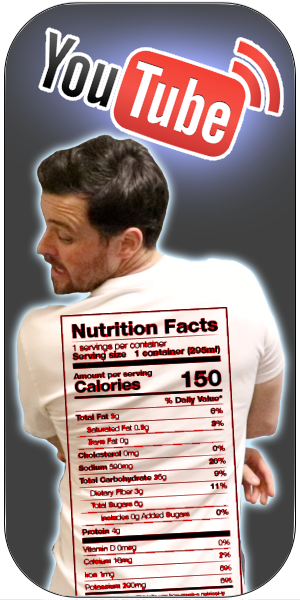Mastering Your Domain Part V – You’re Hungry, Until You’re Not
Ladies and Gentleman…Can I please have your Attention!
I’ve just been handed an Urgent and Horrifying news story, And I need all of you, to stop what your doing and listen! CANNONBA…..

OK, that was important, and it needed to be said, but the real news story here is the fact that there is more than one way to combat hunger! And it’s pretty much the opposite of current practice. Typically when you’re hungry, you eat, and I’d say that’s a pretty good strategy to continue. Why? Well, food happens to be one of our main sources of nutrients and vitamins, as well as the provider of that oh so important Energy of Life (or Glucose).
The key phrase I’d like to highlight from the paragraph above is “When You’re Hungry“. The question becomes, do we eat because we’re hungry, or are we hungry because we’ve become preconditioned to eat?
What is Conditioned Hunger?
Good question, lets first start with what is Conditioning – it’s defined as the procedure in which a biologically potent stimulus is paired with a previously neutral stimulus. In a simple example of food and our favorite four-legged furry friends (NOT Cats), this could be displayed with the association of Food (biological stimulus) and the ringing of a Bell (neutral stimulus). Studies dating back to the 1890’s have shown that after proper conditioning, dogs were drooling uncontrollably by the sound of the bell alone, no food in sight.
What I’m getting to here is the fact that in the “Western” world, we’ve got a lot of bells ringing and human drool flowing. Think about how we associate eating with a time of day or specific activity. A typical day may consist of continuous snacking, eating an oversized lunch, yet still somehow feeling that hunger sensation at dinner. For no other reason then because well…It’s dinner time. When you go to the movies or get your Netflix on, a sudden craving for a movie snack transforms into an uncontrollable sensation. Think of a Ballpark and Hot Dogs, Football and Wings, and everyone has their go-to stress comfort food. All this hunger is not driven by true hunger, but by the association of a neutral activity that’s been conditioned (over time) to eating.
You’re Hungry, Until You’re Not
“I’m Starving”,
“If I don’t eat, I’m gonna DIE!”
“I’m so hungry I can eat a Horse!”
Ever say one of these? I bet you have, or possibly something more disturbing (we won’t go there). Entertain this scenario: You find yourself Sooo hungry, to the extent you can’t bear to think about anything else until you get that Baconator “In Your Belly!” Suddenly, an email that requires immediate action hits your inbox. You work the mission-critical task over the next few hours, without the slightest thought of food. Now approaching dinner, you feel mild, but nothing close to Baconator hunger, which you almost succumb to hours earlier. Funny how that happens, right?
Ghrelin is the hormone that’s most commonly associated with hunger. Leptin, on the other hand, is the hormone that drives satiety. These two hunger regulators work by signaling our brain when it’s chow time, and when to drop the fork (although this part always seems hard).
Research has show, that if you DON’T eat, you WILL NOT have the sensation of hunger exponentially grow. In fact, the opposite seems to be true, by not eating (over 84 hours) subjects saw Ghrelin periodically rise but subdue soon after, declining (on average) over the three plus days [1}.

Speaking from personal experience, after the first 36 hours of a fast (water only), hunger has just about vanished. By this time, Fat Adaptation has arrived and Ketosis is in full swing. Brief hunger sensations would only pop-up when I found myself roaming around the kitchen, or preparing food for others – Bold Strategy Right… Oh Yeah, and that’s probably because of that conditioning thing we spoke about earlier.
Although we tend to preform optimally with a daily consumption of energy (or food), there’s overwhelming scientific evidence that human do not require daily consumption of food to survive, in fact we can live off fat and muscle breakdown for weeks on end (although not a great strategy) . Think back to early humans, they would go days (or weeks) on end without food, searching for that next kill or berry filled pasture. To see more on this fasting evolution (and scientific benefits), take a look Here.
Help Food, Help You
Everybody’s different! Physically, Psychologically, Emotionally. There is no perfect protocol in dealing with our over-adulation of food. It’s a unique situation every time, and that needs to be acknowledged upfront. Hunger is natural, it’s a biological tool that we’ve been equipped with to assist in achieving our ultimate goal, Survival. We just happen to live in much more prosperous times than a few thousand years ago, with food glaring at us from every store front, on the pages of the inter-web, and even when we hitch a ride with Uber.
Your relationship with food is going to be one that you have your whole life. There’s a pretty good chance that you’ve had a bumpy ride thus far, I know I have. It should be something you enjoy, but also respect. It has the power to alter our emotional and psychological state, and we all know what it can do to our waistline. I enjoy my food more than anybody, but often find myself with the “finish the plate (or tray)” mindset rather than stopping at satiety. To offset some of my shortcomings, I’ve begun practicing several fasting and gratitude protocols, and they’re continuously evolving as I further my n=1 experimentation. I regulate the “conditioned” hunger affect by intermittent fasting each day, adding a prolonged fast every few months. Also, I’ve found value in taking a moment before each meal to be grateful for the food that is about to take me to nourish-town USA.
Don’t ignore hunger, understand it, know if you fill your belly with real whole foods, quantity and timing become less of a factor. Switch up your schedule, try something new, it’s quite empowering to watch the personal progress from a change. Experience it! This is an area that deserves an investment, we’re all a lot more capable than we think…





